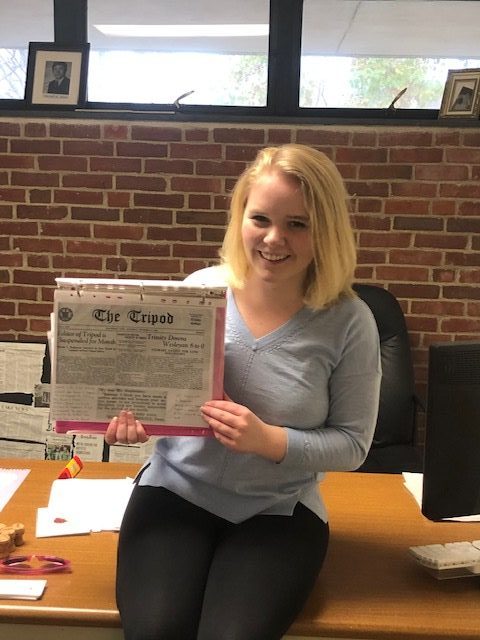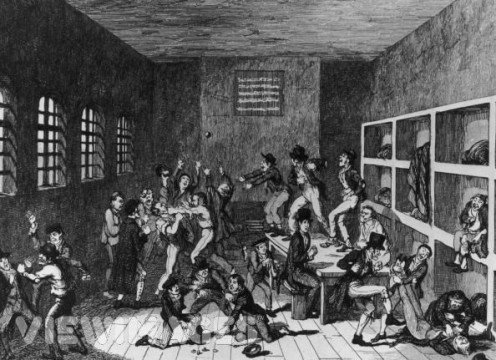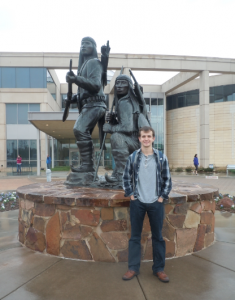History Majors Awarded Prizes At 71st Honors Day Ceremony
Elizabeth M. Sockwell ’21 won the D.G. Brinton Thompson Prize In American History. Ms. Sockwell was awarded $500.00 with the prize. The prize is awarded to a thesis considered by the Department to be an excellent one in the field of American history.
Brendan W. Clark ’21 and Corey T. Cheung ’21 won the Miles A. Tuttle Prize. Mr. Clark and Mr. Cheung were awarded $700.00 with the prize. The prize is awarded to a senior whose thesis considered by the Department to be an excellent one any the field of history.
Brendan W. Clark ’21 won the George B. Cooper Prize In British History. Mr. Tuckwell and was awarded $300.00 with the prize. The prize is awarded to a senior majoring or minoring in History considered by the Department to have done excellent work in British history.
Brendan W. Clark ’21 and Tanuja A. Budraj ’21 won the Ferguson Prize In History. Mr. Clerk and Ms. Budraj were awarded $500.00 with the prize. The prize is awarded to a senior history major who has the best portfolio of essays. Essay portfolios consisted of three essays and a cover letter.
The George J. Mead Prize In History for Scholarship In Non-English Sources, the George J. Mead Prize in History, and the Gerald A. McNamara prize were not awarded this year.
Congratulations to Our Class of 2020 History Thesis Writers!
By Brendan W. Clark ’21
Editor; History Major
Congratulations to four of the History Department’s senior majors who presented the culmination of a year’s worth of research and study this past Friday!
Despite the difficulties which beset the end of their work from the coronavirus crisis, Gillian Reinhard ’20, Aidan Turek ’20, William Tjeltveit ’20, and Connor Struyk ’20 presented their research to the department’s faculty and friends via thoughtful presentations on Zoom.
Reinhard’s thesis, “Orientalist Opera: Western Perceptions of the Other in the Early Twentieth Century,” focused on the premiere of Giaccomo Puccini’s Turandot at the Royal Opera House in London during the 1920s. Reinhard relied on a variety of primary source material and newspaper coverage of the premiere and sought to examine the place and extent of Orientalism in the British imagination. Drawing on scholarship from noted British historians Robert Bickers, Sarah Cheang, and John MacKenzie, Reinhard also argued for a greater recognition of the opera as serving the imperialist ambitions of the British Empire. You can read more about Reinhard and her thesis, which were profiled by History@Trinity in November, here.
Senior Thesis Profile: Aidan Turek Examines Albert Speer and Nazi Apologists
By Brendan W. Clark ’21
Editor; History Major
Aidan Turek ’20 is the President’s Fellow in Political Science and a senior thesis writer in the History Department. History@Trinity’s Brendan Clark spoke with Aidan to ask him a few questions about his thesis and his experience with the History Department.

1. Describe your research topic in two minutes or less (let’s say 200 words or less).
My thesis is a study of Albert Speer, the famed Nazi architect, designer, and industrial genius who was Hitler’s right-hand man and a possible successor. Specifically, I’m examining his life and legacy through the lens of biographization—how historical memory is constructed and deconstructed. Speer was intimately involved in the functioning of the Third Reich, and yet at Nuremberg he successfully presented himself as an apolitical technocrat, and in doing so escaped the executions that befell his colleagues. In his hugely influential autobiography, Speer basically set the tone for Nazi apologists, manipulating his own life and historical fact to prove his own innocence. While more recent biographies have gone back and seriously questioned his life, to this day Speer still guides the discourse surrounding him, and thus Nazism more generally. My goal is to reopen some of the areas neglected by Speer and his biographers, to explore interesting facets of his life that reveal the true extent of his moral culpability and the criminal nature of his actions. I think that researching Speer allows me to delve into fascinating ethical questions while also exploring and illuminating just how history gets constructed.
2. What specific aspects of your academic career at Trinity and your personal historical interests led you to select this topic?
This actually all started after watching a YouTube video about one of Speer’s projects. I figured myself an amateurish expert in World War Two, but Speer’s name had only come up in passing, and none of it dealt with his unique contributions to fascism. And then there’s the fact that he died so recently—in 1981—which got me wondering how Nazis could stick around and have a say for that long. Personally I was drawn in by this muddle of philosophical and historical trends, but I gained quite a bit from Trinity as well. I have an avid interest in political science and German studies, and Albert Speer and his life have actually come up quite a bit. I’ve encountered scholars in classes that discuss the direct historical background, like Weimar Germany’s political culture, alongside literature on the authoritarian capacity of architecture. I was also fortunate enough to travel to Berlin with Trinity to get a hands-on look at what I’ve been researching.
Senior Thesis Profile: Gillian Reinhard Talks Turandot and Tripod
By Brendan W. Clark ’21
Editor; History Major
Gillian Reinhard ’20 is the President’s Fellow in History, the Department’s inaugural Chatfield Fellow, and a senior thesis writer. History@Trinity’s Brendan Clark sat with Gillian to ask her a few questions about her thesis and her experience with the History Department.


- Describe your research topic in two minutes or less.
I am looking at the 1926 opera Turandot, by the Italian composer Giacomo Puccini. The first part of my thesis concerns how different cultures portrayed exoticism and embraced Edward Said’s concept of Orientalism. I am applying what I have learned in the first chapter to look specifically at how British audiences perceived Puccini’s opera when it arrived in London a year later, again from the perspective of Orientalism. The relationship between Britain and China is a unique one, with a long, complicated history, and I am hopeful that an analysis of this opera can shed light on this relationship.
- What specific aspects of your academic career at Trinity and your personal historical interests led you to select this topic?
Firstly, I have studied Mandarin Chinese since middle school and had the opportunity to study abroad in Shanghai during the fall of my junior year. My experience abroad truly shed light on the concept of Orientalism in the West. Also, I read Orientalism, by Edward Said, in my first-year seminar “Arabian Nights” with Associate Professor of History Zayde Antrim. That text has shaped much of my academic work. I decided to look at it through the lens of opera, as it has always been a quirky interest of mine.
The History Department’s Senior Thesis Presentations of 2018
By Gillian Reinhard ’20
Contributing Writer; History Major
On Wednesday, May 2, thesis writers from the class of 2018 presented the culmination of their year-long research projects with topics ranging from Russian Communist influence in twentieth-century China to studies of the environment on the New England coast. Each thesis is the result of countless hours of independent study and serves as a significant achievement for a history major.
The first presenter, Elenore Saunders, introduced her thesis titled “The Bluefish, an Unsolved History: Spencer Fullerton Baird’s Window into Southern New England’s Coastal Fisheries.” This project examined the bluefish, a species of fish that has historically been tied to the disease epidemics of indigenous populations in early America. Ms. Saunders also explored the negative stigma placed on the species and historical comparisons of the fish to wolves.
Senior Thesis Profile: Christopher Bulfinch
By Brendan W. Clark ’21
Editor; History Major
About the Thesis Writer: Christopher Bulfinch ’18 is a senior history major and thesis writer. Chris came to Trinity knowing that he wanted to study history, but did not declare until the spring of his sophomore year. He has studied a myriad of topics from within the history department, but takes a particular interest in subjects of Americana. However, one of his favorite courses falls outside of this realm: “Living on the Margins of Modern Japan,” taught by Jeffery Bayliss, is a course he highly enjoyed and encourages prospective or current history majors to take.
(more…)
History Department’s Senior Thesis Presentations 2016-2017
This academic year, the History Department has nine honor thesis writers. Elizabeth, Sedona, Callie, Dylan, Elm, Chelsey, Eleanor, Seth and Andrew will be presenting on their research on Wednesday, May 3, 2017. The presentations will take place at Seabury Hall 215 (Trinity College), starting at 9:00 a.m. History Thesis Writers, History Majors, members of the History Department, and members of the Trinity and Hartford community are invited and encouraged to attend this special event. A five minute Q+A will follow each presentation. For the full schedule, continue reading….
(more…)
“My Senior Thesis and its Portrayal in Pop Culture”
Chelsey Crabbe ‘17
I am a senior Thesis writer whose topic has been portrayed within a Hollywood movie, a scenario that even clouded my own judgment after watching the film. I am researching the Monuments, Fine Arts, and Archives program (MFAA), a military unit attributed with protecting and salvaging Europe’s greatest cultural treasures against the Nazi regime during World War II. My focus is on the subsequent cultural restitution, or return, that occurred after the war as the Allies found themselves with troves of Nazi loot. I found this topic to be quite fascinating since I am passionate about cultural heritage, a fan of Art History, and a student needing to satisfy her European interests with a topic that had some sources in English. Therefore, I chose to tell the story of the Monuments Men, the full story, and not just the one that would attract moviegoers.
(more…)
The Future is Female! Profiles of the Women Senior Thesis Writers of 2017
Written by: Chelsea Crabbe (History, 2017)
In honor of Women History Month, I’ve decided to write a little bit about our female thesis writers, including myself. As Viginia Woolf insightfully claimed, “for most of history, Anonymous was a woman.” Now, not only are topics of gender becoming valued areas of research within the historical field, at Trinity, five women are exerting their talents within this area of study at the highest of calibers. I have always found some subjects to be gendered. For instance, math and the sciences have been predominantly a male-dominated field, for whatever reason. However, I have also categorized the subject of History as being historically male and with good reason. For centuries and centuries, our histories were written by men and, during this resurgence of women’s rights activism today, I am proud to say that we have five females writing not only histories, but challenging the field, a field that oftentimes can be rigid and traditional. Although our topics may be starkly different, we share a common bond as women within the field of History. While I am obsessing over lost paintings, Sedona is spending hours analyzing the movement of cows and Elizabeth is testing her limits by deciphering colonial manuscripts. Elly is encapsulated by her powerful women who love power and parties and Callie is wrapping her head around what do with a convicted Nazi. We’re committed to our topics and wouldn’t be in the library at all hours if we didn’t love history. I’m sure that my fellow peers would agree that we are history nerds and we’re proud! And you can be sure that our theses will certainly not be signed anonymous.
Michael McLean: Senior Honors Thesis

Trinity senior Michael McLean has always been fascinated by Native American history. Particularly, he sees its underrepresentation in mainstream United States history as a striking opportunity for research. A visit to the Cheyenne River Reservation in South Dakota last winter and related coursework at Trinity motivated him to pursue a senior thesis on the impact of the Civil War on Indian territory.
McLean is also a recipient of the Colin Leroy ’10 Research Fund, which assists history majors with research-based travel and other projects.
[Editor’s Note: History@Trinity will publish soon an article describing the Colin Leroy ’10 Research Fund program, which was established in 2012 to help seniors and rising seniors conduct research for their senior theses.]
Following a recent visit to Oklahoma sponsored by the fund, he has kindly provided History@Trinity with the following statement on his trip:
“From October 23-27, I traveled to the Oklahoma Historical Society in Oklahoma City, in large part due to a grant from the history department set aside for thesis research.
My honors thesis, “We Thought We Had Some Trouble Last Year: Destruction, Survival, and Community during the Civil War on Indian Territory,” is focused on what is today Oklahoma. I am also approaching this subject from the bottom-up. Therefore, the archives in Oklahoma were extremely useful. I was able to use letters, diaries, ledgers, rosters, and war claims to better understand the everyday experiences of regular civilians and soldiers in the area, especially with regards to food, communication and seasonality.
I will specifically be looking at the surprising adaptations that were used during this tumultuous period and how people were able (or forced) to create and maintain communities for their survival.
I am sincerely grateful towards the History Department and the parents of Colin Leroy ’10, who created the research fund, for affording me this opportunity.”
The History Department commends McLean and all other senior thesis students on their hard work.
We also encourage current juniors to consider writing a thesis next year. Please contact your academic advisor and visit the application procedure page available on this website through the menu that appears at the top for more information.




